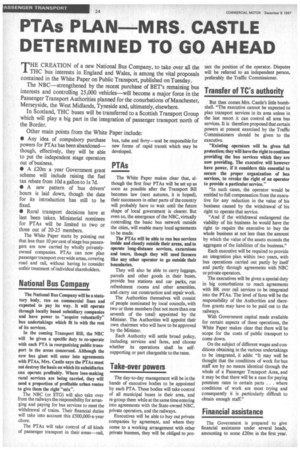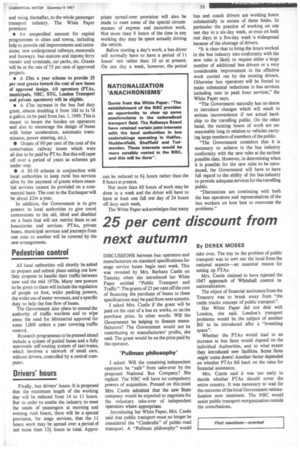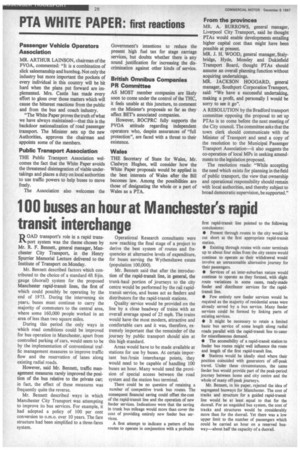PTAs PLAN MRS. CASTLE DETERMINED TO GO AHEAD
Page 26

Page 27

Page 28

If you've noticed an error in this article please click here to report it so we can fix it.
THE CREATION of a new National Bus Company, to take over all the THC bus interests in England and Wales, is among the vital proposals contained in the White Paper on Public Transport, published on Tuesday.
The NBC—strengthened by the recent purchase of BET's remaining bus interests and controlling 25,000 vehicles—will become a major force in the Passenger Transport Authorities planned for the conurbations of Manchester, Merseyside, the West Midlands, Tyneside and, ultimately, elsewhere.
In Scotland, THC buses will be transferred to a Scottish Transport Group which will play a big part in the integration of passenger transport north of the Border. Other main points from the White Paper include:
• Any idea of compulsory purchase bus, tube and ferry—and be responsible for powers for PTAs has been abandoned— new forms of rapid transit which may be though, effectively, they will be able to put the independent stage operators out of business.
• A £20m a year Government grant scheme will include raising the fuel tax rebate from 10d a gallon to Is 7d.
• A new pattern of bus drivers' hours is laid down, though the date for its introduction has still to be fixed.
• Rural transport decisions have at last been taken. Ministerial nominees for PTAs will be limited to two or three out of 20-25 members.
The White Paper starts by pointing out that less than 10 per cent of stage bus passengers are now carried by wholly privatelyowned companies. PTAs can now plan passenger transport over wide areas, covering road and rail, without having to consider unfair treatment of individual shareholders.
National Bus Company
The National Bus Company will be a statutory body, run on commercial lines and expected to pay its way. It will operate through locally based subsidiary companies and have power to "acquire voluntarily" bus undertakings which fit in with the rest of its services.
In the coming Transport Bill, the NBC will be given a specific duty to co-operate with each PTA in reorganizing public transport in the areas concerned. Although the new bus giant will enter into agreements with PTAs, Mrs. Castle says the PTAs must not destroy the basis on which its subsidiaries can operate profitably. Where loss-making rural services are being carried, they will need a proportion of profitable urban routes to give them the right "mix".
The NBC (or STG) will also take over from the railways the responsibility for arranging and paying for bus services to meet the withdrawal of trains. Their financial duties will take into account this £500,000-a-year chore.
The PTAs will take control of all kinds of passenger transport in their areas—rail, developed.
PTAs
The White Paper makes clear that, although the first four PTAs will be set up as soon as possible after the Transport Bill becomes law (next autumn, it is hoped), their successors in other parts of the country will probably have to wait until the future shape of local government is clearer. But even so, the emergence of the NBC, virtually controlling the basic bus network outside the cities, will enable many local agreements to be made.
The PTAs will be able to run bus services inside and closely outside their areas, and to operate long-distance services, excursions and tours, though they will need licences like any other operator to go outside their boundaries.
They will also be able to carry luggage, parcels and other goods in their buses, provide bus stations and car parks, run refreshment rooms and other amenities, and. carry out construction and repair work.
The Authorities themselves will consist of people nominated by local councils, with two or three members (but not more than one seventh of the total) appointed by the Minister. The Authorities will appoint their own chairmen who will have to be approved by the Minister.
Each Authority will settle broad policy, including services and fares, and choose whether its operations shall be selfsupporting or part chargeable to the rates.
Take-over powers
The day-to-day management will be in the hands of executive bodies to be appointed by each PTA. These bodies will take control of all municipal buses in their area, and re-group them while at the same time entering into agreements with the State-owned NBC, private operators, and the railways.
Executives will be able to buy out private companies by agreement, and where they come to a working arrangement with other private busmen, they will be obliged to pro
tect the position of the operator. Disputes will be referred to an independent person, preferably the Traffic Commissioner.
Transfer of TC's authority
But then comes Mrs. Castle's little bombshell. "The executive cannot be expected to plan transport services in its area unless in the last resort it can control all area bus services. It is therefore proposed that certain powers at present exercised by the Traffic Commissioners should be given to the executive.
"Existing operators will be given full protection; they will have the right to continue providing the bus services which they are now providing. The executive will however have power, if it considers this essential to secure the proper organization of bus services, to revoke the right of an operator to provide a particular service."
"In such cases, the operator would be entitled to full compensation from the executive for any reduction in the value of his business caused by the withdrawal of his right to operate that service.
"And if the withdrawal endangered the viability of his business he would have the right to require the executive to buy the whole business at not less than the amount by which the value of the assets exceeds the aggregate of the liabilities of the business."
Each executive will be required to provide an integration plan within two years, with bus operations carried out partly by itself and partly through agreements with NBC or private operators.
The executives will be given a special duty in big conurbations to reach agreements with BR over rail services to be integrated into the PTAs. The level of fares will be the responsibility of the Authorities and therefore grants may have to be paid out to the railways.
With Government capital made available for certain aspects of these operations, the White Paper makes clear that there will be scope for the costs of public transport to come down.
On the subject of different wages and conditions obtaining in the various undertakings to be integrated, it adds: "It may well be thought that the conditions of work for bus staff are by no means identical through the whole of a Passenger Transport Area, and it may be that there will be a case for paying premium rates in certain parts . . where conditions of work are most trying and consequently it is particularly difficult to obtain enough staff."
Financial assistance
The Government is prepared to give financial assistance under several heads, amounting to some £20m in the first year. and rising thereafter, to the whole passenger transport industry. The White Paper promises: • An unspecified amount for capital programmes in cities and towns, including help to provide rail improvements and extensions; new underground railways, monorails and busways: bus stations and depots; ferry vessels and terminals, car parks, etc. Grants will be at the rate of 75 per cent of approved projects.
• A 5m a year scheme to provide 25 per cent grants toward the cost of new buses of approved design. All operators (PTAs, municipals, NBC, STG, London Transport and private operators) will be eligible.
• A £7m increase in the bus fuel duty grant, almost doubling it from 10d to is 7d a gallon, to be paid from Jan. 1, 1969. This is meant to lessen the burden on operators and also to encourage the design of buses with better acceleration, automatic transmission, power steering, etc.).
• Grants of 90 per cent of the cost of the conurbation railway losses which were all due to be paid by PTAs. But this will taper off over a period of years as schemes get under way.
• A 50-50 scheme in conjunction with local authorities to keep rural bus services alive by the payment of grants where essential services cannot be provided on a commercial basis. The cost to the Exchequer will be about £2m a year.
In addition, the Government is to give powers to local authorities to give travel concessions to the old, blind and disabled on a basis that will not restrict them to set boundaries and services. PTAs, private buses, municipal services and journeys from one area to another will be covered by the new arrangements.
Pedestrian control
All local authorities will shortly be asked to prepare and submit plans setting out how they propose to handle their traffic between now and the mid 1970s. Many new powers to be given to them will include the regulation of people on foot, wider parking powers, the wider use of meter revenues, and a specific duty to help the free flow of buses.
The Government also plans to extend the authority of traffic wardens and to wipe away the need for Ministerial approval for some 1,000 orders a year covering traffic control.
Research programmes to be pressed ahead include a system of guided buses and a fully automatic self-routing system of taxi-trains, which involves a network of small cars, without drivers, controlled by a central computer.
Drivers' hours
Finally, bus drivers' hours. It is proposed that the maximum length of the working day will be reduced from 14 to 11 hours. But in order to enable the industry to meet the needs of passengers at morning and evening rush hours, there will be a special provision, for stage services, that the 11 hours work may be spread over a period of not more than 12+ hours in total. Appro priate spread-over provision will also be made to meet some of the special circumstances of express and excursion work. Not more than 9 hours of the time in any working day may be spent actually driving the vehicle.
Before starting a day's work, a bus driver will normally have to have a period of 11 hours' rest rather than 10 as at present. On one day a week, however, the period can be reduced to 9+ hours rather than the 8 hours at present.
Not more than 60 hours of work may be done in a week and the driver will have to have at least one full rest day of 24 hours off duty each week.
The White Paper acknowledges that many bus and coach drivers are working hours substantially in excess of these limits. In particular the practice of working on one rest day in a six-day week, or even on both rest days in a five-day week is widespread because of the shortage of drivers.
"It is clear that to bring the hours worked in the bus industry into conformity with the new rules is likely to require either a large number of additional bus drivers or a very considerable improvement in the effective work carried out by the existing drivers. Otherwise bus operators will be forced to make substantial reductions in bus services including cuts in peak hour services," the White Paper says.
"The Government naturally has no desire to introduce changes which will result in serious inconvenience if not actual hardship to the travelling public. On the other hand, the existing hours of work are unreasonably long in relation to vehicles carrying large numbers of members of the public.
"The Government considers that it is necessary to achieve in the bus industry conformity with the new rules at the earliest possible date. However, in determining when it is possible for the new rules to be introduced, the Government will have to have full regard to the ability of the bus industry to provide adequate services for the travelling public.
"Discussions are continuing with both the bus operators and representatives of the bus workers on how best to overcome the problems." Passenger Vehicle Operators Association
MR. ARTHUR LAINSON, chairman of the PVOA, commented: "It is a combination of slick salesmanship and humbug. Not only the industry but more important the pockets of every individual in this country will be hit hard when the plans put forward are implemented. Mrs. Castle has made every effort to gloss over those matters which will cause the bitterest reactions from the public and from the bus and coach industry.
"The White Paper proves the truth of what we have always maintained—that this is the backdoor nationalization of road passenger transport. The Minister sets up the new Authorities, approves the chairman and appoints some of the members.
Public Transport Association
THE Public Transport Association welcomes the fact that the White Paper avoids the threatened disintegration of viable undertakings and places a duty on local authorities to use traffic powers to help buses to move freely.
The Association also welcomes the Government's intentions to reduce the present high fuel tax for stage carriage services, but doubts whether there is any sound justification for increasing the discrimination against other kinds of service.
British Omnibus Companies PR Committee
AS MOST member companies are likely soon to come under the control of the THC, it feels unable at this juncture, to comment on the Minister's proposals so far as they affect BET's associated companies.
However, BOCPRC fully supports the PVOA attitude regarding independent operators who, despite assurances of "full protection", are faced with a threat to their existence.
Wales
THE Secretary of State for Wales, Mr. Cledwyn Hughes, will consider how the White Paper proposals would be applied in the best interests of Wales after the Bill becomes law. Among the possibilities are those of designating the whole or a part of Wales as a PTA.
From the provinces
MR. A. BURROWS, general manager, Liverpool City Transport, said he thought PTAs would enable developments entailing higher capital cost than might have been possible at present.
MR. J. H. WOOD, general manager, Stalybridge, Hyde, Mossley and Dukinfield Transport Board, thought PTAs should assume an overall planning function without acquiring undertakings.
MR. JACKSON HOGGARD, general manager, Southport Corporation Transport, said: "We have a successful undertaking, making a profit, and personally I would be sorry to see it go".
A RESOLUTION by the Bradford transport committee opposing the proposal to set up PTAs is to come before the next meeting of the City council. The committee asks that the town clerk should communicate with the Minister of Transport and send a copy of the resolution to the Municipal Passenger Transport Association—it also suggests the co-operation of local MPs in seeking amendments to the legislation proposed.
The resolution reads: "While accepting the need which exists for planning in the field of public transport, the view that ownership and operational responsibility should remain with local authorities, and thereby subject to broad democratic supervision, be supported."








































































































